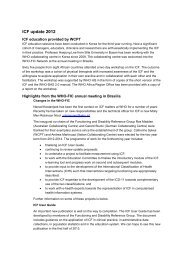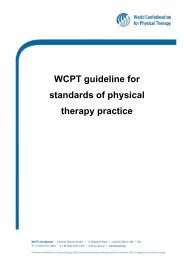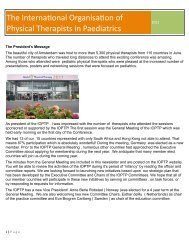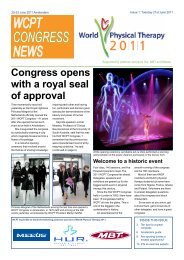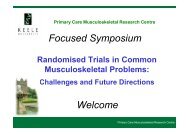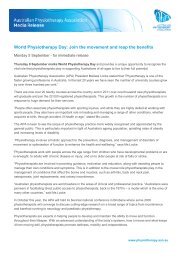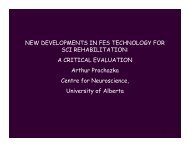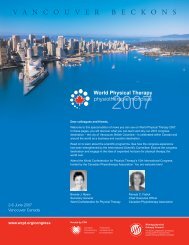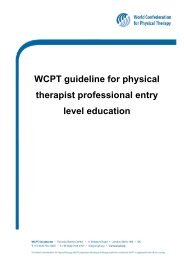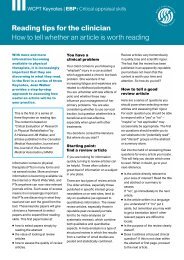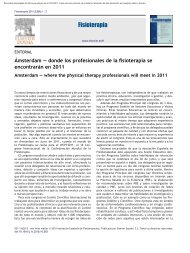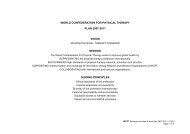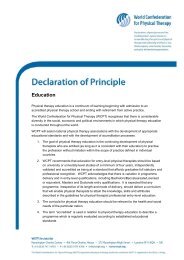wcpt congress: event of a lifetime - World Confederation for Physical ...
wcpt congress: event of a lifetime - World Confederation for Physical ...
wcpt congress: event of a lifetime - World Confederation for Physical ...
You also want an ePaper? Increase the reach of your titles
YUMPU automatically turns print PDFs into web optimized ePapers that Google loves.
PROFESSIONAL ISSUES<br />
ARTHRITIS: THE PHYSIOTHERAPISTS<br />
WHO TREAT IT<br />
Physios vital to managing arthritis<br />
<strong>Physical</strong> activity is key to<br />
quality <strong>of</strong> life <strong>for</strong> people<br />
with arthritis, and, “We<br />
should be the lead people<br />
in managing this,” Peter<br />
Larmer insists.<br />
Peter came to this conclusion through<br />
hard experience. With an arthritic hip,<br />
replaced last year, he realised that his<br />
GP could <strong>of</strong>fer medication (not always<br />
appropriate, and not in his case) and<br />
referral to an orthopaedic surgeon<br />
<strong>for</strong> replacement – but had few other<br />
options and was not able to <strong>of</strong>fer any<br />
advice on exercise, where there is good<br />
evidence <strong>of</strong> effectiveness.<br />
He’s Dr Peter Larmer, Head <strong>of</strong> the<br />
School <strong>of</strong> Physiotherapy at AUT<br />
University, and he’s now on the<br />
Board <strong>of</strong> Arthritis New Zealand. AUT<br />
physiotherapy students are now<br />
learning a different model <strong>for</strong> dealing<br />
with arthritis, and seeing the new team<br />
model exemplified in the AUT clinics.<br />
See May 2011 Physio Matters p.24-25.<br />
“The focus has changed,” Peter says.<br />
“Instead <strong>of</strong> incidental treatment when<br />
someone with arthritis happens to<br />
come to a physio <strong>for</strong> treatment, we’re<br />
focusing on long-term engagement<br />
with people who have arthritis.<br />
“We need to engage with them be<strong>for</strong>e<br />
their arthritis gets so bad that they<br />
break down and can’t cope. We can’t<br />
pr<strong>event</strong> arthritis, but we have a strong<br />
role in pr<strong>event</strong>ing disability.”<br />
Physiotherapists are the ideal people to<br />
monitor people’s physical impairment<br />
level, Peter emphasises. “This is our<br />
area <strong>of</strong> expertise, and I don’t think<br />
we should be shy about saying that.<br />
We modify their exercise programme<br />
so that they can learn to be active<br />
within their limits. We present different<br />
options <strong>for</strong> exercise, like swimming,<br />
cycling, or yoga. We educate them<br />
about all the known health benefits <strong>of</strong><br />
exercise, and in particular weight loss<br />
to avoid overloading joints. We need to<br />
establish a different relationship with<br />
our clients. We should recall them in six<br />
months’ or a year’s time to see whether<br />
they’re maintaining their status or<br />
getting worse. This should be standard<br />
practice. We can then say, ‘You’re<br />
doing well with this,’ or ‘You’re getting<br />
stiffer here so you need to work on<br />
these areas and alter this aspect.’<br />
“As soon as someone is diagnosed<br />
with arthritis, a physio should be part<br />
<strong>of</strong> their management.”<br />
Peter is delighted to have Physiotherapy<br />
New Zealand working in with the<br />
awareness raising ef<strong>for</strong>ts <strong>of</strong> Arthritis<br />
New Zealand, and he urges individual<br />
physiotherapists to display in<strong>for</strong>mation<br />
about the campaign in clinics and<br />
departments. “When patients come in<br />
and see that, they realise that physios<br />
have a role in managing arthritis.”<br />
Physiotherapists have the training<br />
and skills to manage arthritis, Peter<br />
says, but a nationwide educational<br />
package would help update them on<br />
evidence-based research and achieve<br />
consistent management.<br />
The physiotherapist’s disease<br />
Be<strong>for</strong>e modern anti-inflammatory<br />
medications and newer biological<br />
drugs, ankylosing spondylitis (AS) was<br />
<strong>of</strong>ten known as “the physiotherapist’s<br />
disease”. Although medications have<br />
advanced and the medical management<br />
<strong>of</strong> patients with AS is now much<br />
more sophisticated than previously,<br />
there is no doubt that physiotherapy<br />
still makes a huge difference to the<br />
lives <strong>of</strong> those with the disease. International<br />
best practice guidelines highlight<br />
the need <strong>for</strong> a combined approach to<br />
treatment <strong>of</strong> AS incorporating both<br />
medical and exercise-based therapy <strong>for</strong><br />
optimal patient outcomes.<br />
Physiotherapy and NSAIDs (nonsteroidal<br />
anti-inflammatory drugs) are<br />
first-line management <strong>for</strong> ankylosing<br />
spondylitis which must be used be<strong>for</strong>e<br />
patients can be considered <strong>for</strong> the new<br />
(and very expensive) biological drugs.<br />
Even <strong>for</strong> a patient on one <strong>of</strong> these new<br />
medications, exercising to maintain<br />
their range <strong>of</strong> motion remains essential.<br />
Inflammatory arthritis also increases a<br />
person’s risk <strong>of</strong> cardiovascular disease<br />
and osteoporosis, making regular<br />
activity even more important.<br />
Chronic inflammation in the spinal<br />
joints and ligament attachments can<br />
lead to joint de<strong>for</strong>mity and <strong>event</strong>ually<br />
fusion if left untreated. “If we can get<br />
people stretching their spinal joints<br />
and ligaments regularly, this helps to<br />
counteract any thickening which occurs<br />
as part <strong>of</strong> the inflammatory process<br />
<strong>of</strong> AS,” says Jo Rae <strong>of</strong> the Wellington<br />
Regional Rheumatology Unit based at<br />
Hutt Hospital. Exercises that strengthen<br />
the postural muscles <strong>of</strong> the spine<br />
are also important to reduce excessive<br />
mechanical loading on inflamed<br />
spinal joints.<br />
Ankylosing Spondylitis Clinic<br />
Jo and a nurse run a clinic where<br />
patients with ankylosing spondylitis<br />
attend <strong>for</strong> up to an hour every six or<br />
06 | PHYSIO MATTERS AUGUST 2011



